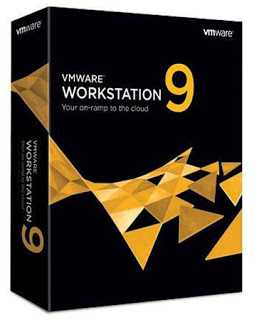
VMware Workstation is a hypervisor that runs on computers; it
enables users to set up multiple virtual machines(VMs) and use them
simultaneously along with the actual machine. Each virtual machine can
execute its own operating system, such as Microsoft Windows, Linux or
BSD variants. As such, VMware Workstation allows one physical machine to
run multiple operating systems simultaneously. Workstation is developed
and sold by VMware, Inc., a division of EMC Corporation.
New added Features in vmw 9:
VMware Workstation 9.0 promises, as do most new releases of the
product, to support ever more powerful virtual machines. The list of
improvements include:
Faster startup performance — though, by how much I don’t know.
Personally, I have not had an issue with the VM startup times under
Workstation 8. My unencrypted VMs boot nearly instantaneously on my
desktop, so I do not really know how much additional performance there
is to get.
Intel™ Ivy Bridge compatibility — this sounds nice, but really, am
I going to have to update to Workstation 9.0 to get this? I have a
desktop with a motherboard that can support an Ivy Bridge processor (I
currently have a Sandy Bridge series in it), and I purchased it with the
intention of updating once the Ivy Bridge series were out and widely
available. But, if updating the processor would force me to upgrade
Workstation in order to achieve compatibility, both can wait — my
development desktop is peppy enough for now.
USB 3.0 support for Windows 8 virtual machines — great, but do I
get USB 3.0 support in my other VMs? Well, it depends. Workstation 9
supports attaching USB 3.0 devices to Windows 8 virtual machines. The
latest portable devices use USB 3 (SuperSpeed) to achieve faster
transfer rates for data. USB 3.0 devices such as portable storage
devices and video equipment can be connected directly to Windows 8 and
Linux virtual machines that contain in-box drivers USB 3.0 controllers.
So, aside from those situations, the answer is apparently: no. So, this
feature’s usefulness will depend on your environment.
support for OpenGL 2.1 on Linux and improved 3D graphics
performance — OK, this one sounds at least moderately interesting to me.
I use VariCAD for some 3D product design and idea development, and it
would be nice if the already-peppy product ran even faster in VMs. There
is mention of an improved Windows XP graphics driver and fundamental
changes to improve performance and enable more advanced graphics
capabilities in the future, each of which sounds nice.
Remote desktop type capability via “WSX” — although I personally
have no need to access my VMs from my phone or whatever, VMware seems to
think this is a big deal. They included a new Web interface called WSX
that allows access to virtual machines running in Workstation or on
VMware vSphere® from tablets, smart phones, laptops or desktop PCs. They
claim to do this through a new high performance, Web-based interface
that delivers a native desktop experience and does not require flash or
browser-based plug-ins. Again, nothing I care about. And, from their
release notes page, comes the following quote of concern: “WSX is
currently not supported for production environments” — interesting…
even as this is a highlighted key-feature of the release that I am
supposed to pay for?
Some of the reason for this not-production-ready situation has to do with device and browser support:
This feature requires a very modern browser that supports HTML5
with WebSockets. VMware recommends using the Google Chrome 17 browser on
PCs and the Apple Safari 5 browser on Mac OS hosts and iPads. Currently
there are issues using this feature with Microsoft Internet Explorer
10. WSX may work with other browsers and on Android tablets running Ice
Cream Sandwich with the latest version of Google Chrome installed, but
more testing is required.
Restricted Virtual Machines — finally, a feature I can see value
in! Per VMware’s release announcement: “IT administrators and
instructors can create virtual machines and configure them to prevent
employees or students from dragging and dropping files between virtual
and physical desktops, attaching devices, or tampering with the virtual
machine settings. Once restrictions are configured, the virtual machines
can be encrypted and distributed to run on Mac, Windows, or Linux PCs
with VMware Fusion® 5 Professional, Workstation 9, or VMware Player™ 5.”
This restricted VM functionality only works on the most recent
versions of the VMware products, and it is really the only “killer
feature” (from my perspective) that would make me consider the upgrade.
Being able to configure a virtual machine with one password to launch it
and another password to change its settings should allow administrators
to distribute VMs to users with much less concern that they will wreak
havoc on the VM after it is deployed.
Downloading Virtual Machines from vSphere — OK, this would be my
second feature worth considering WS9 for: Workstation 8 enabled
customers to (only) upload virtual machines to vSphere, and now
Workstation 9 enables downloading virtual machines from vSphere by
dragging them from the remote host to the My Computer section of the
Virtual Machine Library. Although nice, I can not help thinking that
this should have been an 8.1 (i.e., free update) feature.
Disk Cleanup — this feature sounds good to me, as I currently rely
on the standalone VMware Converter product to recover / shrink unused
disk space. WS9 includes a new management option to easily recover disk
space, and I need to play with it and compare to the capabilities of
Converter. It sure would be nice to simplify this all-too-often
requirement.
Some other miscellaneous features worth noting — views of your
virtual machine on the task bar now include controls to change the power
state; “quick switch” is back and hosts tabs have been included in the
full screen toolbar; nested virtualization improvements allow users to
run ESX as a guest OS and run a 64-bit operating system nested in ESX
using less system resources.
Discover the true power and flexibility of your desktop or laptop
computer with VMware Workstation. Reduce hardware costs by 50% or more
by running multiple operating systems simultaneously on a single
physical PC. Automate and streamline tasks to save time and improve
productivity.
DOWNLOAD FROM

406.5 MB


![Download The latest version OF IDM patched version [Full version][working]](https://i2.wp.com/www.gammerson.com/wp-content/uploads/2011/12/Download-IDM-Patched-version-fullversion-1.png?resize=350%2C200&ssl=1)